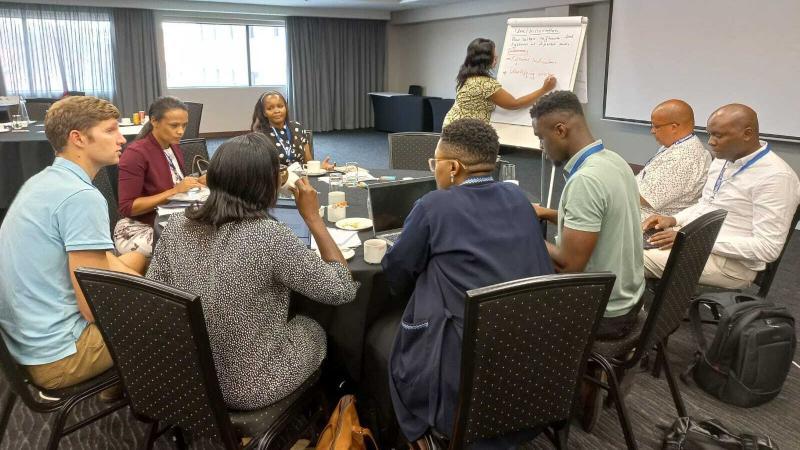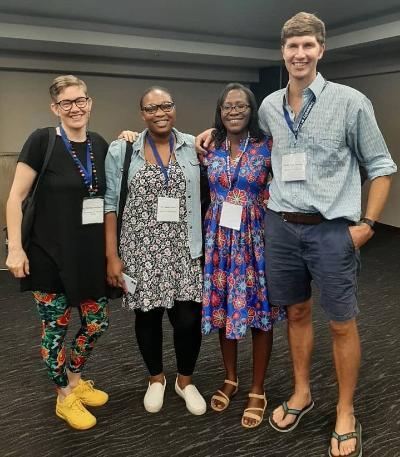
Early Career Researchers are shifting the world's grand challenges towards sustainability.
Drs Prossie Nakawuka (Makerere University, Uganda), Rebecka Henriksson (UKZN), Bukho Gusha (RU) and Matthew Weaver (RU) from the ARUA Water Centre for Excellence attended the Carnegie Corporation of New York (CCNY)-funded Early Career Researcher (ECR) Meeting in Pretoria. The weeklong event brought ±80 ECRs from more than ten African countries to collectively engage on some of the world's most pressing problems.
The meeting was designed to enable experiential learning and structured to balance ECR skills development sessions, informative talks and discussions, networking and mentor-led thematic working group sessions. The working groups were required to develop and present a realistic concept note addressing a particular problem theme taking a transdisciplinary approach. Grand challenges that working groups and mentors focussed on included Social well-being and improved quality of life (Prof. Valerie Møller), One Health (Prof. Wanda Markotter), Sustainable food systems and nutrition (Prof. Edward Nesamvuni), Energy transition (Prof. David Walwyn), Climate change and ecological biodiversity (Prof. Abel Ramoelo), and Transdisciplinary data science (Prof. Vukosi Marivate).
Prossie, Rebecka and Matthew participated in the Sustainable food systems and nutrition working group. They developed a concept note proposing the development of a food systems analytical framework that foregrounds culture as a key metric to understand and transition African food systems towards sustainability. Their mentor, Prof. Edward Nesamvuni, is excited by their novel framework and is committed to securing funding to see the concept note developed into a comprehensive proposal in 2023.
Bukho participated with colleagues in the Climate change and ecological biodiversity working group. They developed a concept note to explore biodiversity loss in the Inkomati-Usuthu catchment management area. Their mentor, Prof. Abel Ramoelo, is supporting their concept, and building upon it through identifying other case study areas in Southern Africa to better understand biodiversity loss. The group plan to develop a positioning paper describing the biodiversity drivers and impacts in the Inkomati-Usuthu River catchment.
Other insightful discussions facilitated during the week, each full of insights and resources to draw upon, included:
- Systems thinking approaches in transdisciplinary research.
- Philosophical underpinnings and practicalities of Science communication. The new SARCHI Chair, led by Prof. Mehita Iqani, based at Stellenbosch University, is driving research and building a community of support for science communication in South Africa and beyond.
- Understanding policy engagement and the research-policy interface. Perceived roles of researchers and how your research can make a difference in the world.
- Working in teams, leading and managing roles and dynamics. Before starting a group project, consider mapping and having conversations about different team members' strengths and preferences to enable your project to run more smoothly and happily.
- Planning and managing your career from ECR to researchers of the future. Navigating the funding landscape, pressure to publish, pressures of academic life, work-life balance and staying on track towards your goals.
Despite the gruelling program, we all engaged with energy and rigour. We left with heads full of ideas, connections to follow up on and resources to tap into. If you are an ECR and ever have the opportunity to participate in an event like this, JUMP ON IT!

Pic 2: The ARUA Water CoE representatives attended the ERRM meeting. Drs. Henriksson, Gusha, Nakawuka and Weaver
Written by Matthew Weaver, Rebecka Henriksson, Bukho Gusha and Prossie Nakawuka
